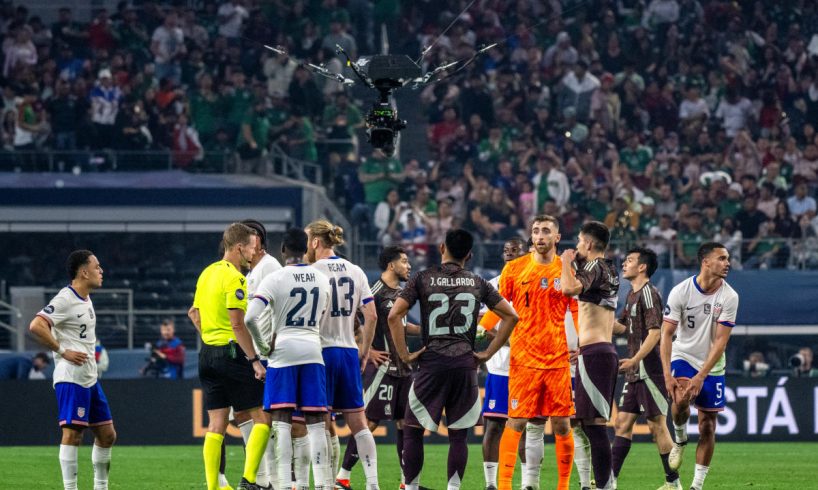
USMNT and El Tri players wait for Sunday’s Nations League final to resume after the match was halted due to an offensive chant. (Photo by Shaun Clark/ISI Photos/Getty Images)
ARLINGTON, Texas — The punctual, inevitable, distasteful roar boomed around AT&T Stadium, and, well, here we go again.
There was another U.S.-Mexico match on Sunday.
Another regional final marred by homophobia.
There was another round of bland, evasive public-address announcements, which failed to address the infamous “p***” chant.
There was another chorus of boos, and another suspended game, and all we could do, as lovers of fútbol, as humans, was sit there and soak in hate.
By now, you could probably write the rest of this story. You could write the Concacaf statement condemning discrimination. You could write the social-media squabbles over whether the word is homophobic. You could acknowledge that, yes, it has multiple meanings, but explain that millions of LGBTQ+ people feel its violence.
“Even if it doesn’t go with that [homophobic] intent, if other people feel it that way, then it is that way,” Yon De Luisa, then president of the Mexican soccer federation, told Yahoo Sports in 2021. “That’s why we want to eradicate it.”
But three years later, very little meaningful progress has been made, so here’s the story again. In the second half of Sunday’s Concacaf Nations League final, with the U.S. leading 2-0, hundreds (and probably thousands) of the 59,471 fans in attendance began to raise their voices. They crescendoed — “ehhhhHHHH” — as U.S. goalkeeper Matt Turner stood over the ball. “P***!” they yelled as he booted it. Minutes later, they yelled it again.
We’ve heard the “p***” chant twice now.
Just got a reading over the PA warning fans. (The Spanish version was booed.)
The game has not been stopped though.
— Henry Bushnell (@HenryBushnell) March 25, 2024
The second chant triggered a PA reading, first in English, then in Spanish, about “fair play and mutual respect.” A minute later, Turner lined up for another goal kick, and heard the crescendo. He turned to the crowd, and turned up his palms, helpless. They pelted him with the word again — and then again, and again. The sixth gleeful cry, in the 88th minute, finally compelled Canadian referee Drew Fischer to blow his whistle, hold up his hands, and bring the players toward the center circle.
And for over four minutes, they stood there, underneath AT&T Stadium’s gigantic video board, which displayed the following message, alternating between the two languages:
“The referee has stopped the match due to discriminatory chanting.
“If this behavior continues, you will be ejected from the stadium, the match could be suspended or abandoned and there will be no refunds.
“Discrimination has no place in football.”
Concacaf, the regional soccer governing body running the Nations League, would later say in its statement that “security staff in the stadium identified and ejected a significant number of fans.” The number, of course, was nowhere near significant enough. The chant continued during stoppage time, as loud as ever. It triggered a PA announcement, then interrupted the announcement. It triggered a second stoppage, which lasted around 90 seconds.
It was heard, clearly, at least 10 times. The threat of more finally triggered Fischer’s final whistle. By then, thousands of fans had filed out, fed up. Another festive night had been felled by stupidity and/or bigotry.
Some who stayed, meanwhile, felt trapped. Thousands who watched from afar felt exasperated.
“Every day that goes by, every match that goes by where we sit on our hands and do nothing, we become laughable at best and closer to encouraging this nonsense at worst,” the president of American Outlaws D.C., a U.S. soccer supporters group, wrote on X. “No fan should ever have to weigh their safety when factoring if they should attend a match. Yet here we are once again.”
Concacaf would argue, perhaps, that it has tried. Any rational observer, though, would argue that it hasn’t tried nearly enough. Its enforcement has been inconsistent at best. Its protocols now feel toothless. Fans who weaponize the word don’t feel deterred. If anything, they feel empowered.
That became evident in Las Vegas last June, and again Sunday night. The chant was an afterthought as Mexico’s players battled and fans remained hopeful for 45 minutes. It reared its ugly head once hope waned and frustration bubbled. The protocols, perversely, have empowered fans who want to send a message to the Mexican soccer federation (FMF). Match stoppages only amplify their voice. A match abandonment almost seems to be their goal. Why else would they hurl the chant at their own goalkeeper, the revered Memo Ochoa, as they did once on Sunday?
Privately, among experienced North American soccer officials, there is a growing acknowledgement that the protocols aren’t working. And there is worry that high-stakes deadlines are alarmingly near. The men’s World Cup is coming to North America in 2026. Thirteen games are coming to Mexico, including the opener. Sixteen are coming to Texas, including nine at AT&T Stadium in Arlington.
“It is extremely disappointing that this matter continues to be an issue at some matches, particularly in the context of the next two years presenting such a tremendous opportunity to grow the sport in our region,” Concacaf said in its statement.
Well then, Concacaf … perhaps you could do something?
Stadium authorities and local governments could also do something.
The FMF could do a lot.
The U.S. Soccer Federation could even crack down. It has a policy on derogatory chanting at international matches — but doesn’t enforce it.
FIFA, of course, could also do plenty — which is why FIFA president Gianni Infantino’s Monday morning statement on Instagram raised eyebrows and ridicule. “Discrimination, of any kind, has no place in football and no place in society,” Infantino wrote. “I call on the relevant authorities to ensure that those responsible are held to account for their actions.”
Uh, Gianni … aren’t you an authority, if not the authority?
FIFA has had intermittent, moderate success mitigating the chant. But its approach has been reactive and spotty. The time for preemptive action was years ago. The time for a rethink is now. The world is watching. It wants to feel welcome. Right now, the message from all “relevant authorities” is essentially: “No guarantees.”






